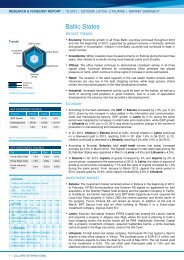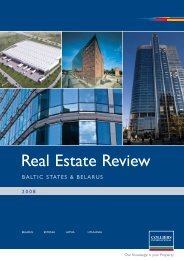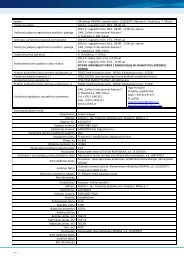baltic states and belarus real estate market review - Colliers
baltic states and belarus real estate market review - Colliers
baltic states and belarus real estate market review - Colliers
You also want an ePaper? Increase the reach of your titles
YUMPU automatically turns print PDFs into web optimized ePapers that Google loves.
Real Estate Market Review 2011 | Estonia Legal Overview<br />
Concentration control<br />
Transfer of <strong>real</strong> <strong>estate</strong> (both asset <strong>and</strong> share transfers) may be<br />
subject to concentration control by the competition authorities.<br />
Public Restrictions<br />
Public restrictions may apply to use of <strong>real</strong> <strong>estate</strong> in the<br />
following: special conservation areas, coastal areas, Natura<br />
2000 protection areas, heritage protection zones, protected<br />
zones of power lines, railways, roads, <strong>and</strong> other utility networks.<br />
Restrictions may mean that part of the <strong>real</strong> <strong>estate</strong> may not be<br />
used for building or the owner must avoid activity in protected<br />
zones, or that building or other activities require consent from<br />
utility networks, the operator, or the governing body (eg heritage<br />
protection authorities, local government, environmental<br />
protection authorities).<br />
Encumbrances<br />
The following rights, which are entered in the L<strong>and</strong> Book, may<br />
encumber <strong>real</strong> <strong>estate</strong>: usufruct, servitudes, building title, rights<br />
of first refusal <strong>and</strong> mortgages. In general, these rights may be<br />
used in <strong>real</strong> <strong>estate</strong> transactions <strong>and</strong> are entered in the L<strong>and</strong><br />
Book under notarised agreements to secure the interest of the<br />
parties, third persons, or neighbouring <strong>real</strong> <strong>estate</strong> owners.<br />
The L<strong>and</strong> Book may register notation of a lease agreement,<br />
which ensures that upon transfer of <strong>real</strong> <strong>estate</strong> the new owner<br />
may not terminate the lease agreement within three months of<br />
acquiring the premises citing urgent personal need to use the<br />
premises.<br />
Mortgage<br />
Real <strong>estate</strong> purchase is often financed by a loan. Usually, a<br />
mortgage is established on <strong>real</strong> <strong>estate</strong> as security in favour of<br />
the bank financing the purchase. The mortgage agreement is<br />
usually concluded at the same time <strong>and</strong> in the same document<br />
as the sales agreement.<br />
If a mortgage already encumbers <strong>real</strong> <strong>estate</strong> before sale <strong>and</strong> the<br />
purchaser needs a mortgage for its own financing purposes, the<br />
existing mortgage is typically transferred to the bank financing<br />
payment of the purchase price. This transaction structure is<br />
more cost-efficient compared to deleting the existing mortgage<br />
<strong>and</strong> establishing a new one, since it saves on both notary fees<br />
<strong>and</strong> state duty.<br />
Lease Agreements<br />
General<br />
For residential leases the law provides extensive m<strong>and</strong>atory<br />
regulation protecting the tenant.<br />
Business leases are much more flexible but a set of m<strong>and</strong>atory<br />
rules also applies.<br />
On transfer of <strong>real</strong> <strong>estate</strong>, lease agreements survive change of<br />
ownership. However, an owner who needs the premises<br />
urgently for own use may terminate a lease agreement within<br />
three months of acquisition. This right may not be exercised if a<br />
notation of the lease agreement has been entered in the L<strong>and</strong><br />
Book.<br />
Duration <strong>and</strong> Expiry of Lease Agreement<br />
Lease agreements may be either for specified or unspecified<br />
terms. If the parties have not agreed otherwise, either party to<br />
a lease agreement for an unspecified term may terminate a<br />
residential or business lease by giving at least three months’<br />
notice.<br />
A lease agreement for a specified term expires at the end of the<br />
term. Extraordinary termination is allowed for material breach<br />
of agreements for both unspecified <strong>and</strong> specified terms.<br />
If, after expiry of a lease agreement, the tenant continues to use<br />
the leased premises, the lease is taken to have become a lease<br />
agreement entered into for an unspecified term unless the<br />
owner or tenant expresses some other intention to the other<br />
party within two weeks of expiry of the lease agreement (applies<br />
to the tenant) <strong>and</strong> as of when the owner learns that the tenant<br />
is continuing to use the leased premises (applies to the owner).<br />
Lease Payment <strong>and</strong> Accessory Expenses (Utilities)<br />
Rent is usually paid once a month to the bank account of the<br />
l<strong>and</strong>lord. The rent is typically indexed (eg changes in local CPI<br />
may be capped at eg 3 per cent per annum). It is common to pay<br />
a deposit of one to three months’ rent.<br />
Accessory expenses (utilities) such as electricity <strong>and</strong> water are<br />
considered included in the rent if not otherwise agreed in the<br />
lease agreement. Prevailing <strong>market</strong> practice is that the tenant<br />
pays for utilities <strong>and</strong> other expense items in addition to the rent<br />
in accordance with invoices from service providers.<br />
Property Management<br />
Maintenance of <strong>real</strong> <strong>estate</strong> is usually carried out by the owner or<br />
by a professional management company which provides<br />
technical support, accounting, <strong>and</strong> other related services.<br />
Apartment owners may establish an apartment owners’<br />
association for the common management of the property.<br />
KAIDO LOOR<br />
Partner, Head of the Real Estate & Construction Team in Estonia<br />
SORAINEN Estonia<br />
Pärnu mnt 15, 10141 Tallinn, Estonia<br />
Phone +372 6 400 930<br />
Kaido.Loor@sorainen.com<br />
BALTIC LAW FIRM OF THE YEAR<br />
Awarded by:<br />
Financial Times & Merger<strong>market</strong><br />
International Financial Law Review<br />
PLC Which lawyer?<br />
International Tax Review<br />
p. 73













